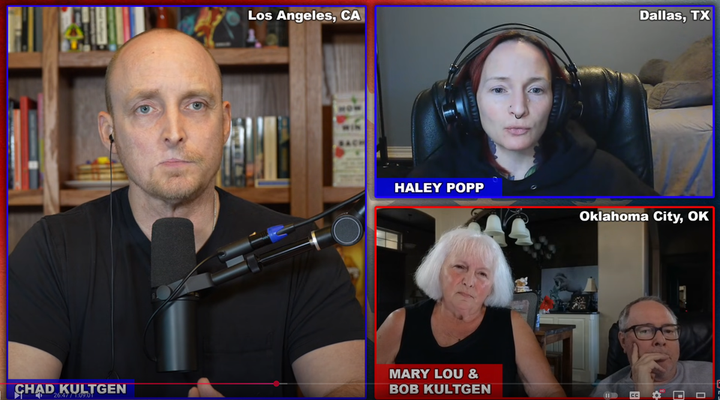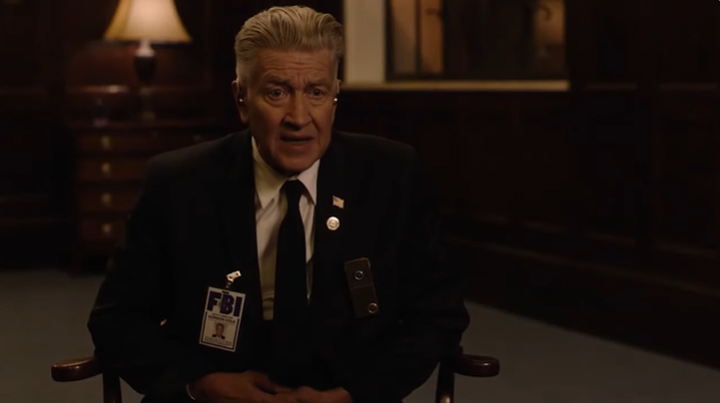Be Bolder, Not a Boulder
Advice to my fellow people of privilege on not being an obstacle. Part 1 of 2.

Last week I wrote about the qualities of light in dark times, about how even basic acts of kindness and repair and bravery create a point of differentiation and distinction that darkness can't touch.
Maybe someday I'll talk about some practical things that create light. I tend not to write about things like that, in part because there are so many direct actions one can take, and I feel as if any list will just favor one over another. But a greater part of it is the fact there are so many people who know so much more about that than me, and I'm learning from them. I know much more about the experience of moving from supremacist unawareness and complacency into a halting, faltering, and partial awareness and conviction, so that's what I tend to write about.
So today, I'm thinking about how sometimes we get in the way of light. By we I mean my fellow people of privilege, which is mainly who this essay is for. If that is you, then detect your privilege—your license from our institutions and society at large to be considered white or male or cis or christian or documented or able-bodied, to give a few prominent examples—and bring these parts of yourself to this essay. To the extent that you do not find yourself described in this paragraph, I don't presume to advise; I'll only say that I will do my best and I apologize for the ways that my best isn't good enough.
There's a quality prevalent among those who benefit from traditions of supremacist belief, but who have nevertheless become aware of supremacy and have decided to oppose it; it's a certain diffuse quality of shallowness, whereby we oppose supremacy but still remain in it by allowing it to inform our underlying motivations and goals, often in ways we haven't made ourselves aware of. By we I mostly mean me, mostly, by the way—that's also who this essay is mostly for—mostly.
When we do these things, I've noticed, we become obstacles to light. We occlude what light there is from the vision of others so it shines on only us, as if to say this light is for me first and foremost; I lay a better claim to it than you do, and you ought to improve your position so that you can appreciate it like I do and talk about it with the same accuracy that I can. When we do this, we're like the tall guy who takes the front seat at a play or concert (I say as a tall guy who has indeed sometimes taken the front seat at a play or concert). I sense in those who take this posture an underlying motivation to cast oneself as more knowledgeable about the light of awareness, or as the one more aligned to the spirit of human equality, and the one who must be consulted about how best to advance it. This strikes me as a foolish way for a person who is privileged by supremacy to behave, and also as an ironically supremacist posture to take toward matters pertaining to fascist darkness and the light of humanity that opposes it.
This is behavior that makes awareness and conviction our exclusive property rather than our recent discoveries. It can't oppose supremacy because it is supremacy. This isn't light; it's an obstacle. A tall guy at a concert. A boulder in the road. A total eclipse of the sun.
And, as any bit of light offers an unmistakable point of distinction and differentiation from darkness, and can inspire more people to become more light, so an obstacle that blocks the view of light will naturally diminish that inspiration, and assist the growth of darkness.
I think we'd do well to not be obstacles; we'd do better to move the ones that will move, and demolish the ones that won't.
So here are a couple brief thoughts on how.
Or don't subscribe. I'm not the boss of you. But if you do subscribe, my gosh the splendors that await you.
Let people be newly dismayed.
This is tricky, because one thing that is crucial to the struggle against supremacy is to speak truth about supremacy, and people who are just learning about supremacy still speak from their prior beliefs, and say things like "this isn't us" when all of this very much is us, and "we're better than this," when we pretty clearly aren't better than this, and so on.
If you are a person privileged by supremacy, there was once a time you didn't know about supremacy. Something happened to shock you out of it, and you started to learn that your frameworks were wrong, and at that time you were almost certainly surprised and shocked and angered and dismayed. People don't change their prior assumptions from a place of comfort, is my point. Most of us have, at some point or another, been that person saying "this isn't us."
There are people who are not privileged by supremacy, and there was never a time they didn't know. What they have learned about over time is that people of privilege usually can't be counted on when the chips are down. This leads to a whole lot of well-earned skepticism and impatience on the part of people who aren't privileged by supremacy when it comes to the shock and surprise and anger and dismay about supremacy when it comes from privileged people, and as a privileged person I think it's my job to accept the critique and prove my good intent by paying the price of reparation, rather than insisting that assumption of good intent be given to me without having earned it.
I remind myself that these are people who are far better at detecting false intention than those of us who are advantaged by supremacy, and they have far more to lose for misplaced trust. When we scold such people for their well-earned skepticism, we risk ignoring these facts.
However, I have noticed that we people privileged by supremacy have a tendency to take this same stance toward newly aware people, a stance which is not ours to assume. We seem to feel that it is our business to meet people who are in the same place that we were just a few short years or decades ago, and meet their shock and surprise and anger and dismay with a skepticism and an impatience we haven't earned.
We say things like "are you surprised?"
We say things like "why does this shock you?"
We say "oh so you're only angry now?"
We say things like "where have you been?"
The issue isn't that we are wrong to point out that there are those for whom all these shocking and surprising and angering and dismaying things are no shock at all; or to point out that these are things that a lot of people have known their whole lives. The issue is that we, people who are privileged by supremacy, are positioning ourselves as if we are one of those who have always known, too, when in fact we are new to awareness ourselves. We're claiming something that isn't ours, which is a very supremacist sort of posture to take.
When we do this, we risk extinguishing the light of budding awareness and conviction in favor of celebrating ourselves; we risk ignoring the fact that the shock and surprise and anger and dismay are going to be necessary for people of privilege to experience in order to deconstruct their own supremacy, and we risk ignoring the fact that we have more in common with the ignorant than the knowledgeable. When we decide that it's more important to occlude the light—not to teach those willing to learn, but simply to show off that we are a bit further down the road than others—we create an obstacle, we become a tall guy in a front seat, a boulder in the road, a total eclipse of the sun.
Nor is it to say that newly aware advantaged people won't, in their shock and surprise and anger and dismay, say some real ignorant shit. They will, of course. After all, you did once, and sometimes still do. I sure did, and still do more than I'd care to admit. And good for you that you recognize it, but bad for you if you think that means you aren't still journeying. If you have it in you to teach, then teach—but do it from where you are on the road, and don't steal valor you haven't earned. Instead of asking are you surprised? say I was surprised once, too; here's what I know. Instead of what took you so long? say I just got here recently; here's what I've learned.
Be bolder, not a boulder.
Another quick interruption to scroll quickly past before you continue the essay.
The Reframe is me, A.R. Moxon, an independent writer. Some readers voluntarily support my work and pay whatever they want. Why would you pay for something that is free? Click the button; answers await you.
Embrace the polarization of solidarity.
I was listening to a favorite podcast recently; the hosts were doing a live event and the Q&A portion had been going on for a while when a guy took the mic and began his question with "this is a time of extreme political polarization" or words to that effect—at which point yellow lights on my internal dashboard immediately started flashing. By the time the questioner had gotten to asking about "identity politics" the lights were flashing red. The question was framed to cast the person as a sort of neutral curious party interested in understanding "both sides" (red light flashing and alarms blaring now), but the person's reaction to the host's (calm, measured, informed, and well-reasoned) answer soon revealed he held a definite position; an anti-queer one.
The questioner was what he was. He knew it. He was trying to hide this fact by posing as neutral because he understood, perhaps instinctively, that neutrality in the face of fascism is usually deemed by this supremacist society to be the respectable posture. And a lot of us, too, if we are those privileged by supremacy, have a similar instinct, and oppose fascism only to the extent that we are still thought of by society as respectable and reasonable, and beyond those boundaries we will not stray. This is where well-earned skepticism comes in as regards our intentions, incidentally.
I'd recommend removing the word "polarization" from your lexicon for now. It won't be very useful in this age of ascendant fascism, and it's far more likely to be misused than used well. Polarization is a thing that happens, and I suppose we could say it applies to the current situation, but I think it's a real weasel word and it tends to be used mostly by real weasels.
The issue isn't to say that polarization can't be destructive. The issue is that polarization is something that happens when two sides are equally and mutually diverging from each other, and it's usually employed to indicate that the thing they are diverging from is a matter that is trivial next to the benefits of unity. Thus, the word polarization slyly insinuates a state of affairs that is simply not true.
What's happening today is not two sides equally and mutually diverging from one another over matters that are immaterial next to the goal of unity. What's happening is that a group of people privileged by supremacy is asserting that privilege through oppressive and violent domination of all others in order to strangle human unity to death. What's happening is the institutional kidnapping, terrorizing, robbing, and murdering of our family members and our friends and neighbors. What's happening is violent and oppressive and systemic, and it is being done by just one side among an infinite array within the great diversity of human art, one single side that defines itself by its unearned privilege, then uses the power that privilege affords to frame its own murderous violence as order and justice, and frame any struggle in response to its violence, no matter how peaceful, as violence deserving escalating violence in return.
So we can see that opposing fascism will require a solidary with hundreds of different sides against the sole murderous one. Perhaps that one murderous side will experience this solidarity as "polarization," but we don't need to agree with them about that, or "agree to disagree" about it. In fact, it is our moral imperative to disagree with them about that. The price for disagreeing will be very steep for some of those of us who pay it—it may well include oppressive violence—but for all of us, it will cost the supremacist privilege of respectability.
When we agree with these weasel assertions of respectable supremacy—that supremacist murder and oppression is actually polarization, and that there are just two sides, and that both sides are right and wrong—we stay neutral in order to defend our privileges of respectability within a supremacist society, we block out the light of human solidarity. When we decide that it's more important to snuff out solidary simply to indicate that we are respectable, we create an obstacle, a tall guy in a front seat, a boulder in the road, a total eclipse of the sun. We once again prove correct the skepticism of those who have known of supremacy all their lives, that we who are privileged cannot be counted on to pay the bill for solidarity when it arrives, after we've gobbled up most of the food.
In an age of fascist darkness, solidarity is light. If such a thing as solidarity is indeed polarizing, we should seek such polarization and embrace it. Be bolder, not a boulder.
I'm out of time today, so this is Part 1. I'll see you next week with a few other thoughts:
Find your mission, let others find theirs;
Be earnest; and
Keep your despair out of circulation.
OK? Until next week, then.
The Reframe is totally free, supported voluntarily by its readership.
If you liked what you read, and only if you can afford to, please consider becoming a paid sponsor. If you'd like to be a patron of my work, there's a Founding Member level that comes with a free signed copy of one of my books and thanks by name in the acknowledgement section of any books I publish.
Looking for a tip jar but don't want to subscribe?
Venmo is here and Paypal is here.
A.R. Moxon is the author of the novel The Revisionaries and the essay collection Very Fine People, which are available in most of the usual places, and some of the unusual places. You can get his books right here for example. He is also co-writer of Sugar Maple, a musical fiction podcast from Osiris Media which goes in your ears. If he were near you, he wouldn't be far from you.




Comments ()